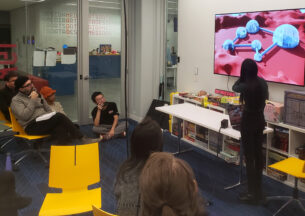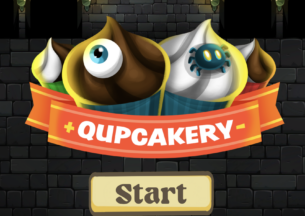Students Help Local Organizations Do More with Data at Annual Scopeathon
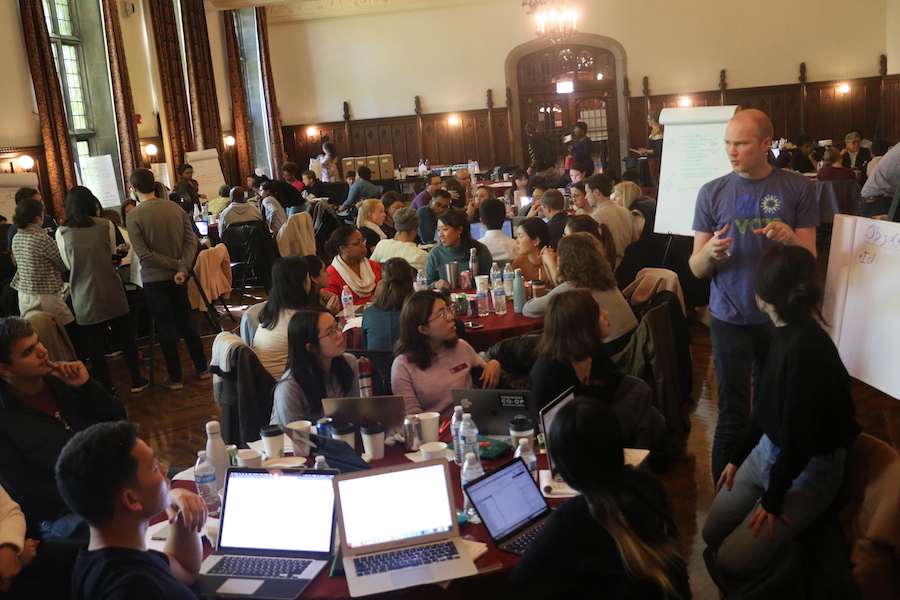
While using data and technology to improve operations has become routine in the business world, these approaches have yet to trickle down to many non-profit, government, and community organizations. For these groups, the human connection remains paramount, but there are many untapped benefits in carefully collecting information about their important work and using it to enhance effectiveness and outreach.
For the last four years, the annual Civic Scopeathon has helped Chicago organizations realize this potential by collaborating with UChicago students in a unique twist on the hackathon model. The event is organized by South Side Civic, a group led by students from the Masters of Science in Computational Analysis & Public Policy (MS-CAPP) a program co-administered by the Department of Computer Science and the Harris School of Public Policy, and from the Harris Masters of Public Policy program.
In this year’s installment, held October 12th and 13th, over 100 graduate and undergraduate students worked with 11 organizations, strategizing how data and technology could resolve their most difficult challenges. Attendees heard talks from speakers with experience using data science with non-profit and government partners, participated in workshops on problem scoping, data collection and exploration, and other relevant topics, and constructed action plans that could guide collaboration beyond the event itself.
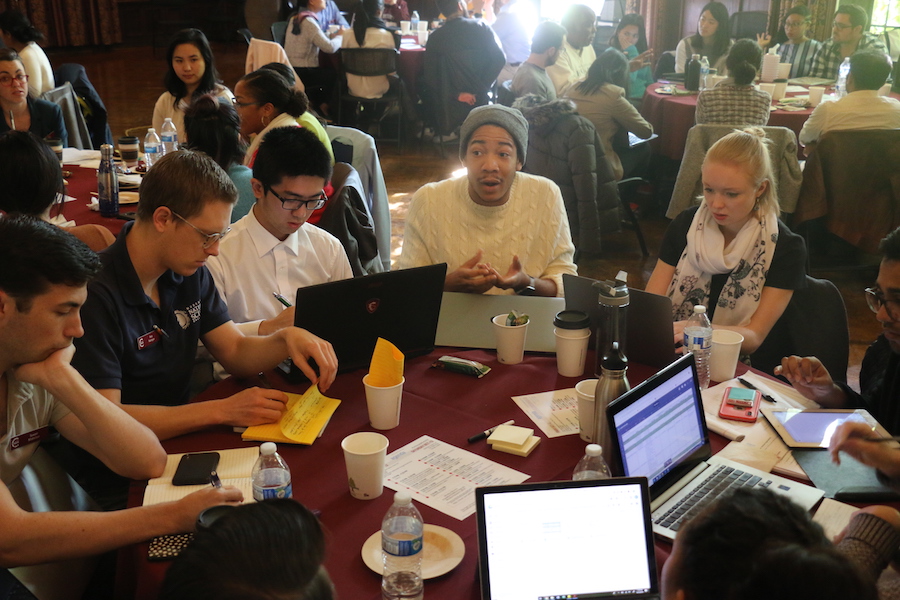
Working with three more organizations and hosting more students than on previous editions, this year’s Scopeathon planning committee worked for over seven months to put together an event that could engage participants in a full day and a half schedule. On top of the working sessions, the event included workshops that addressed the potential and challenges of using data and technology to address social issues, including a keynote by Matt Pazoles, Chief Data Scientist at the Center of Government Excellence at Johns Hopkins University.
This year’s participating organizations represented a variety of different missions, including improving LGBTQ health, supporting education for homeless youth, economic development of South Side Chicago communities, and reducing energy costs for city facilities. By Saturday night, just a little over 24 hours since the event started, teams of students and organization personnel had created 11 action plans with solutions for outcome measurement, data collection and analysis, reducing attrition, and other important processes.
The plan named “Best Outcomes-Driven Approach” by Scopeathon judges was created for In Her Shoes Foundation, a group driven “to empower and inspire every woman and girl to be her personal best.” Representatives from In Her Shoes asked for new ways of measuring the impact of their Ready Set Girls program, which aims to improve participants’ self-esteem and academic achievement. The team of 8 created a complete roadmap stretching from the design of a pilot survey through the creation of a data repository, data analysis, and follow-up assessments of mentor and staff satisfaction.
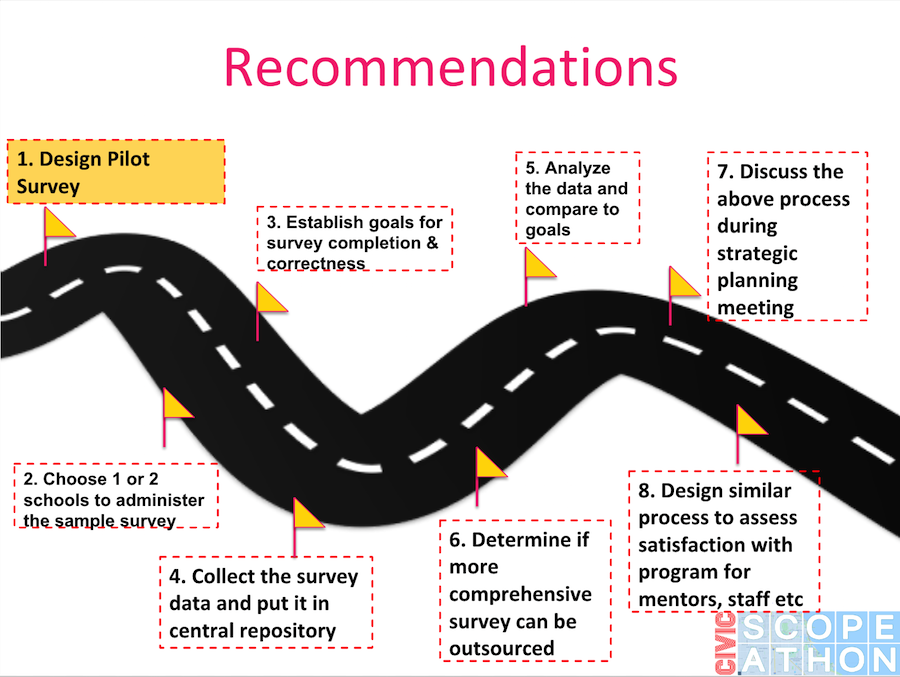
Another award, for “Biggest Potential Impact,” went to the team working with Chicago HOPES for Kids, which provides educational support for homeless children. In this case, the organization already uses a literacy assessment to collect data on its program’s success, but struggles with attrition — less than a quarter of the children tested before their intervention are also tested after its completion. The Scopeathon team generated new ideas for intermediary assessments, proposing questions that volunteers can ask during the program to generate more data on each child’s progress.
The team working with Claretian Associates, which provides affordable housing in the South Chicago neighborhood, produced the plan named “Most Shovel-Ready.” Claretian recently acquired a YMCA facility that will provide housing for over 100 senior citizen tenants, and sought help gathering data on residents’ health and wellness to inform programming and services. Among other suggestions, the team proposed using a key fob that could track usage of different facilities in the building, providing an automated “survey” of tenant experience.
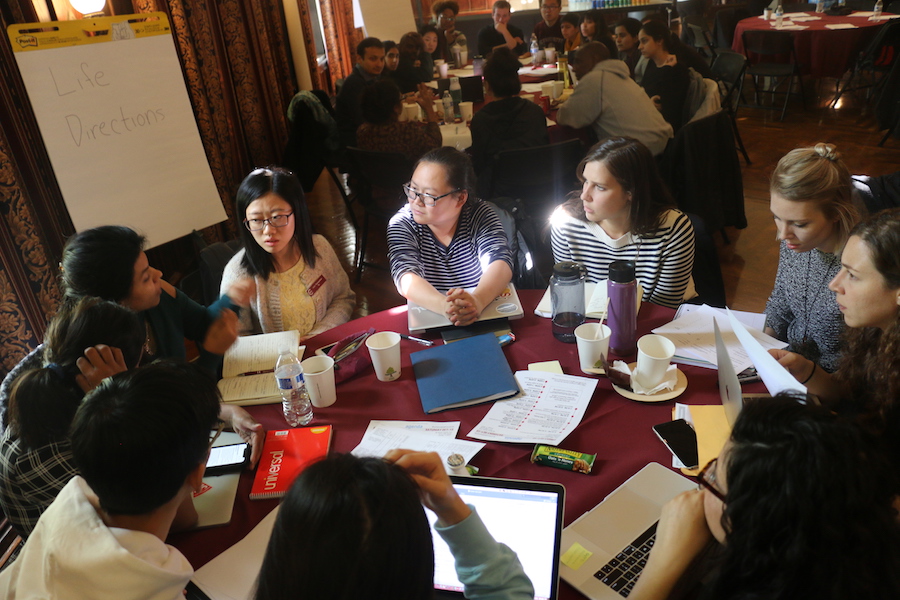
Representatives from the community organizations said they were pleasantly surprised at how much progress was made over such a short time.
“We had a problem that was very large scale and that we believed we’d clearly identified,” said Edwin Wang, a quality assurance manager with Alternative Schools Network. “Students identified aspects that we hadn’t thought of before, and in that way it was a very surprising and useful exercise. I thought it was awesome to get a fresh look at our problems.”
The work does not stop after the event finishes, as South Side Civic members support the continuation of the projects and ideas that emerge from the Scopeathon. On Saturday, organization representatives got together with members from other student and associated organizations from The University of Chicago, such as Community Action Bureau, IOP Tech Team, Campus Catalyst, and the Education Policy Student Association, all of which provide pro bono consulting services and that could potentially partner with the organizations to carry out the proposals. For the rest of the academic year, the team expects to continue connecting participants with resources across the University that can provide support to help implement the projects.
Photos by Cristina MacGregor Vanegas and Ari Anisfeld.











